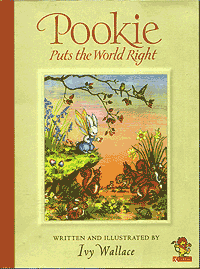 Pookie Puts the World Right
Pookie Puts the World Right
by Ivy Wallace,
Current UK edition: Collins
Originally published 1947
"There has been a terrible storm in the night!" said Belinda, "three trees have blown down."
"Trees blown down?" gasped Pookie, jumping up wide awake. "But what about all the
birds in the branches? And the rabbits among the roots?"
"They will be homeles now, " worried Belinda, "and some may be hurt."
"Oh Belinda!" cried Pookie. "what can we do?"
"There's a lot we can do!" said Belinda. "But first, get dressed and help me light the fire."
A tale to teach caring and to teach nature's savage ways to children? So it first appears. Pookie
and Belinda heroically help their friends and neighbours agianst the elements.
However, as Winter comes early, Pookie echoes human hubris in fending it off and banishing it
from his realm.
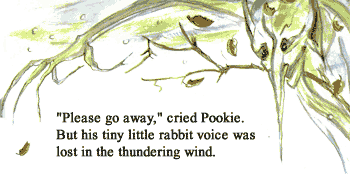
"Winter!" he shouted. "Can you hear me? I think you are cruel. You come too early and
spoil all the berries and nuts with your frost and snow! And woodland folk go hungry until
spring comes!" Pookie added. "And you are so rough... you smash trees down, and little homes
in them come crashing down too! Winter, I wish you would go away and never come back!"
This has consequences. It was autumn again, the animals had berries and nuts and everyone was happy,
at first. But eventually Pookie is made to see the necessity of the natural cycle:
"The year must have four seasons," replied Nommy Nee wisely. "Spring, for things to grow in;
summer, for sunshine and flowers; autumn, for ripening fruits and preparing for cold days;
winter, for resting. We need winter, Pookie. Winter is the world's resting time."
It is explained that the animals that made the mistake of picking homes in weak trees had made a
shown that they lacked wisdom. The wise animals did not lose their homes.
Pookie, ostracised and realising his mistake, journeys off to find Winter and to tell it to come
back to the woods as it always did. He tells Winter, though, that he stil thinks it cruel. Winter
responds:
"I am truly sorry if I hurt some animals," apologised Winter. "But my winds must blow
hard to bring down the dead leaves and my rains must fall to fill the streams. It is often
the animals' own fault if they come to harm, because they all come into the world with
instinct." [...] "Instinct! It's another word for common sense," explained Winter wisely.
"They've all got it, but some are too lazy to use it!"
Of course, Winter does return and the harm that Pookie's hubris might have come to cause is
averted.
Whilst there is a bit of the social Darwinist in this tale, nonetheless there are real lessons, and,
let us face it, even the harsher judgements here are rooted in truth though we may be discomfitted
by the way it is put. Would that mankind could so readily reverse the damage inflicted by his
rampant and arrogant, and unfortunately seemingly untutored and blind, attempts to tame the
wilds by destroying them, as if there could be no consequences to his actions in a highly interdependent
biosphere.
A recent analogy suggested to me was that we should imagine all the elements of our
environment as connected by string and rubber bands. Shifting any one element cannot but cause shifts
and adjustments throughout the ecosphere. The consequences were thus widespread and highly
unpredictable. Much analysis and knowledge of the workings of ecosystems is needed for safe interaction, and
even then, we cannot be entirely sure what we do, or omit to do, may bring. I purposely
mention omissions, as it is all too easy to choose inaction in the face of uncertain consequences,
and this is no better than action. A balance is required.
For Pookie, the balance might have been found by stopping at helping his neighbours, as he
heroically did during the storm, and not seeking to change Nature itself.
So, Wallace has created a cautionary tale, delivered in a cute picture book, with fairies and
goblins to engage the very young. I liked it, and my daughter loved it.
Review: TB
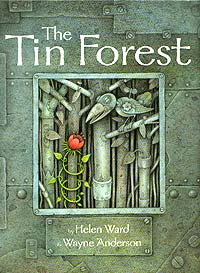 The Tin Forest
The Tin Forest
written by Helen Ward
& illustrated by Wayne Anderson
UK Publisher: Puffin Books, 0142501565, 2001
"There was once a wide, windswept place, near nowhere and close to forgotten, that
was filled with all the things that no one wanted. Right in the middle was a small
house, with small windows, that looked out on other people's rubbish and bad
weather."
The man that lives in this house, in the landfill, lives surrounded by grey waste, and he
continually tries to tidy, sift, and sort the rubbish. This Sisyphian task is alleviated
only by his dreams - of lush and vibrant forests.
The world he is embedded in stays the same, he can never get ahead of the incoming
waste.
One day, he sees a broken light bulb, and he has an idea - it reminds him of the petals
of a flower. He rivets it to a plunger, that cups it, with some scraps of tin, that he has shaped
like leaves, rivetted to the handle as if it were a stalk.
Slowly he converts the fields of waste into:
"A forest made of tin. It was not the forest of his dreams, but it was a forest
just the same."
Into this forest he places more creations that he has concocted - birds and cats and lizards...
Then one day a real bird flew in and ate some scraps. It flew away.
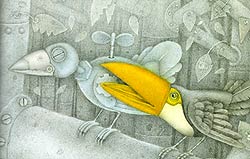 The man was saddened. This splash of colour had outshone his creation. He made a wish, and the next
day the bird returned, with its mate. Seeds were dropped, and plants grew. Other creatures
returned, to stroll by their tin counterparts, and soon a vibrant forest appeared, "near nowhere and close to forgotten."
This is a beautiful tale with darkly powerful illustrations. We might wish our own world
to be repaired in such a fashion. Of course, this is exactly what Nature continually and
forever tries, season after season, to do. Once man was drowned by this irrepressible
tide, and then he slowly evolved ways to make small safe harbours and islands against
the sea of seasons.
The Tin Forest is a little further along, near to today. Man
has found ways to develop havens against the elements, yes, but he has gone too
far. Those of us with eyes to see, like the little old man in the story, might wish that we
may find a balance again. Where did we pass the balance point? Can we return there?
Can we find a way to not overshoot and end up once again continually swamped
by the tide, or a way to, on reaching the balance point, create a kind of stasis that
averts our repeating the cycle of destruction?
Whatever the answers may be, Nature shall return and undo our damage. This is
cold comfort, though, if the conditions we create before that happens destroy
us and all our works - would that we could know with certainty where to pull back from our
headlong flight towards destruction, and where we are on safer ground. This,
though, is a luxury that we are fast outrunning.
Review: TB
The man was saddened. This splash of colour had outshone his creation. He made a wish, and the next
day the bird returned, with its mate. Seeds were dropped, and plants grew. Other creatures
returned, to stroll by their tin counterparts, and soon a vibrant forest appeared, "near nowhere and close to forgotten."
This is a beautiful tale with darkly powerful illustrations. We might wish our own world
to be repaired in such a fashion. Of course, this is exactly what Nature continually and
forever tries, season after season, to do. Once man was drowned by this irrepressible
tide, and then he slowly evolved ways to make small safe harbours and islands against
the sea of seasons.
The Tin Forest is a little further along, near to today. Man
has found ways to develop havens against the elements, yes, but he has gone too
far. Those of us with eyes to see, like the little old man in the story, might wish that we
may find a balance again. Where did we pass the balance point? Can we return there?
Can we find a way to not overshoot and end up once again continually swamped
by the tide, or a way to, on reaching the balance point, create a kind of stasis that
averts our repeating the cycle of destruction?
Whatever the answers may be, Nature shall return and undo our damage. This is
cold comfort, though, if the conditions we create before that happens destroy
us and all our works - would that we could know with certainty where to pull back from our
headlong flight towards destruction, and where we are on safer ground. This,
though, is a luxury that we are fast outrunning.
Review: TB
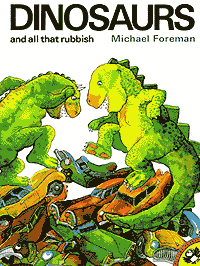 Dinosaurs & All That Rubbish
Dinosaurs & All That Rubbish
by Michael Foreman
Puffin, 014055260X, 1972
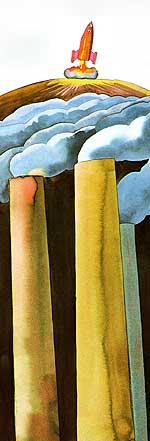 Wherein Man sees the stars, and uses all the Earth's resources in order to attain them.
When he reaches the moon, he looks around and sees what a bankrupt place it is. He wistfully
wishes for grass, flowers, trees.
Further off is another star.
Wherein Man sees the stars, and uses all the Earth's resources in order to attain them.
When he reaches the moon, he looks around and sees what a bankrupt place it is. He wistfully
wishes for grass, flowers, trees.
Further off is another star.
"I will go to that star," said the man, and away he went again in his rocket.
The Earth is a steaming brown mess, yet far below are sleeping dinosaurs. They awake after
hundreds of years, as the heat of the rubbish dumps burning above them disturbs them.
A dinosaur held his nose as he looked around.
"POOH!" he said.
"There is nothing on this planet but mess. If we are going to live here we'll
have to get busy."
So they proceed to clear up after man, and as they do so, the Earth is replenished.
Meanwhile, the man still travels on to his 'new star' unaware that in truth it is his
old Earth, reborn. Touching down, he looks aroound:
"At last," he said, "I have found my paradise.
The dinosaurs have something to say about this, and man is rudely disabused of the notion
that it is his, and is then shocked to discover that it is the old Earth he had destroyed.
Eventually, the argument between man and beast stops, and man is made to promise that he
will live in harmony this time round, on his second chance new Earth. It is not simply
for him and his:
"This time the earth belongs to everyone, not parts of it to
certain people but all of it to everyone, to be enjoyed and cared for."
A celebration follows.
It is hardly necessary to pick out the message here. As a picture book for the
very young, this is a lovely ecological fable, and the parents' that have the pleasure
of relating the tale to their children may wake-up to themselves just a little, too.
Review: TB
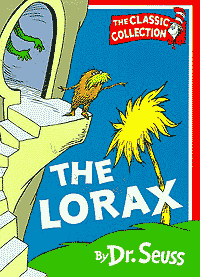 The Lorax
The Lorax
by Dr Seuss
first published by Random House, 1971
This is a typical Dr Seuss book - surreal illustrations and a tale told in rhyme.
The subject is less typical, however. The Lorax is a scathing look at the
logic of industrialist consumer capitalism, and it's, you know, for kids! It is
a wonderfully told, if depressing, cautionary tale.
The tale opens in a broken down garden, at the house of a creature called the
Once-ler. There is a mysterious entity called a Lorax, that legend tells was
lifted away from a spot by the Oncer-ler's house. The mystery is why was it
taken, what was it, why was it there? For a small fee the Once-ler agrees to
tell the tale to a small boy who has gone there to investigate the tales he
has heard.
The Once-ler then relates a tale of greed, capitalism and environmental rape,
centering around the wonderous Truffula tree. He himself is the businessman
who harvest the trees to make products whose popularity ramps up production
to unsustainable levels.
The Lorax is an odd creature, that pops up from the stump of a felled Truffula:
"Mister!" he said with a sawdusty sneeze,
"I am the Lorax. I speak for the trees.
I speak for the trees, for the trees have no tongues.
And I'm asking you, sir, a the top of my lungs" -
he was very upset as he shouted and puffed -
"What's that THING you've made out of my Truffula tuft?"
The Lorax's warnings are ignored, and as production increases and the daily
harvest of Truffulas inceases, the Lorax disappears for a while. When he
returns he issues a new warning: that the Truffula is not the only entity
he speaks for and seeks to protect - other creatures too are losing their
homes, and their food as the Truffula forests diminish.
"They loved living here. But I can't let them stay.
They'll have to find food. And I hope that they may.
Good luck, boys," he cried. And he sent tham away.
I, the Oncer-ler, felt sad
as I watched them all go.
BUT...
business is business
And business must grow
regardless of crummies in tummies, you know.
The number of species that suffer increases, the range of eco-niches
damaged increaes, the Lorax's complaints get louder and more angry.
Until, the Once-ler shouts back that he intends to just keep his
empire building, and that he intends on:
"turning MORE Truffula Trees into Thneeds
which everyone, EVERYONE, EVERYONE needs!"
The rampant consumerist ethos, one that underpins all of
modern capitalism and drives our economies, is based
on the belief that we NEED what we do not. The Thneed is a
lovely jumper, perhaps similar to an Angora Sweater. A
luxury item, coveted, but needed? No.
[But] at that very moment, we heard a loud whack!
From outside in the fields came a sickening smack
of an axe on a tree. Then we heard the tree fall
The very last Truffula Tree of them all!
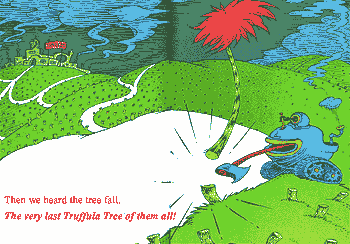 The business collapses, amongst the smoggy ruins of the
landscape, and the Lorax takes his leave with a sad backwards
glance. He has left behind a stone plinth, with one word
carved upon it - UNLESS.
The Once-ler's tale is told. He realises what was meant by 'UNLESS',
a meaning that had seemed opaque over the years. But, now the boy
was there to hear the tale, the Once-ler realised that 'UNLESS'
meant, unless the lesson is learned and passed on, then the whole
world will end up destroyed by our greed. We must learn from our
mistakes, we must learn care. The Once-ler passes on to the boy
the very last Truffula seed, hoping that it will take root and
thrive and that this will lead to the return of the Lorax and all
his friends.
So, Dr Seuss has here created a wonderful fable for our times,
one filled with greed and careless destruction, and ended with
hope, a hope he invests in our children, a hope he gives to us
to pass on to our children.
The only quibble is over allowing ther to be somewhere for the
creatures that have 'left' to go to, and thus to come back from.
Here on our small resource limited globe, we know that the biomes
that are spared from the factories are nonetheless affected as
the ripples caused by our damage spread throughout our finite
pond. Extinction is a global phenomenon, not merely local. We
can only hope that the situatuion is still recoverable, but will
we see the Lorax again, or is he, like the dodo, gone for good?
Perhaps we can save other species, and ourselves?
That one small seed is a small hope - will it germinate? Will it
thrive? Can it reproduce alone? Will a new forest of Truffula trees
be protected or will it merely revive the Thneed trade?
We will have to wait and see...
But, perhaps, just perhaps, you and I can be the Lorax? Perhaps
this time we can succeed in convincing our neighbours that we can
live with less luxury? Perhaps we can stop what the Lorax could not.
Review: TB
The business collapses, amongst the smoggy ruins of the
landscape, and the Lorax takes his leave with a sad backwards
glance. He has left behind a stone plinth, with one word
carved upon it - UNLESS.
The Once-ler's tale is told. He realises what was meant by 'UNLESS',
a meaning that had seemed opaque over the years. But, now the boy
was there to hear the tale, the Once-ler realised that 'UNLESS'
meant, unless the lesson is learned and passed on, then the whole
world will end up destroyed by our greed. We must learn from our
mistakes, we must learn care. The Once-ler passes on to the boy
the very last Truffula seed, hoping that it will take root and
thrive and that this will lead to the return of the Lorax and all
his friends.
So, Dr Seuss has here created a wonderful fable for our times,
one filled with greed and careless destruction, and ended with
hope, a hope he invests in our children, a hope he gives to us
to pass on to our children.
The only quibble is over allowing ther to be somewhere for the
creatures that have 'left' to go to, and thus to come back from.
Here on our small resource limited globe, we know that the biomes
that are spared from the factories are nonetheless affected as
the ripples caused by our damage spread throughout our finite
pond. Extinction is a global phenomenon, not merely local. We
can only hope that the situatuion is still recoverable, but will
we see the Lorax again, or is he, like the dodo, gone for good?
Perhaps we can save other species, and ourselves?
That one small seed is a small hope - will it germinate? Will it
thrive? Can it reproduce alone? Will a new forest of Truffula trees
be protected or will it merely revive the Thneed trade?
We will have to wait and see...
But, perhaps, just perhaps, you and I can be the Lorax? Perhaps
this time we can succeed in convincing our neighbours that we can
live with less luxury? Perhaps we can stop what the Lorax could not.
Review: TB
Reviewers:
RA - Robert Allen
TB - Tim Barton
SB - Steve Booth
ED - Éanna Dowling
EV - Eric Valencic
CG - Chellis Glendinning
RR - Rob Ray
This page is available for sponsorship
|



 Pookie Puts the World Right
Pookie Puts the World Right

 The Tin Forest
The Tin Forest

 Dinosaurs & All That Rubbish
Dinosaurs & All That Rubbish
 Wherein Man sees the stars, and uses all the Earth's resources in order to attain them.
When he reaches the moon, he looks around and sees what a bankrupt place it is. He wistfully
wishes for grass, flowers, trees.
Further off is another star.
Wherein Man sees the stars, and uses all the Earth's resources in order to attain them.
When he reaches the moon, he looks around and sees what a bankrupt place it is. He wistfully
wishes for grass, flowers, trees.
Further off is another star.
 The Lorax
The Lorax
